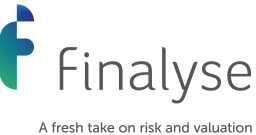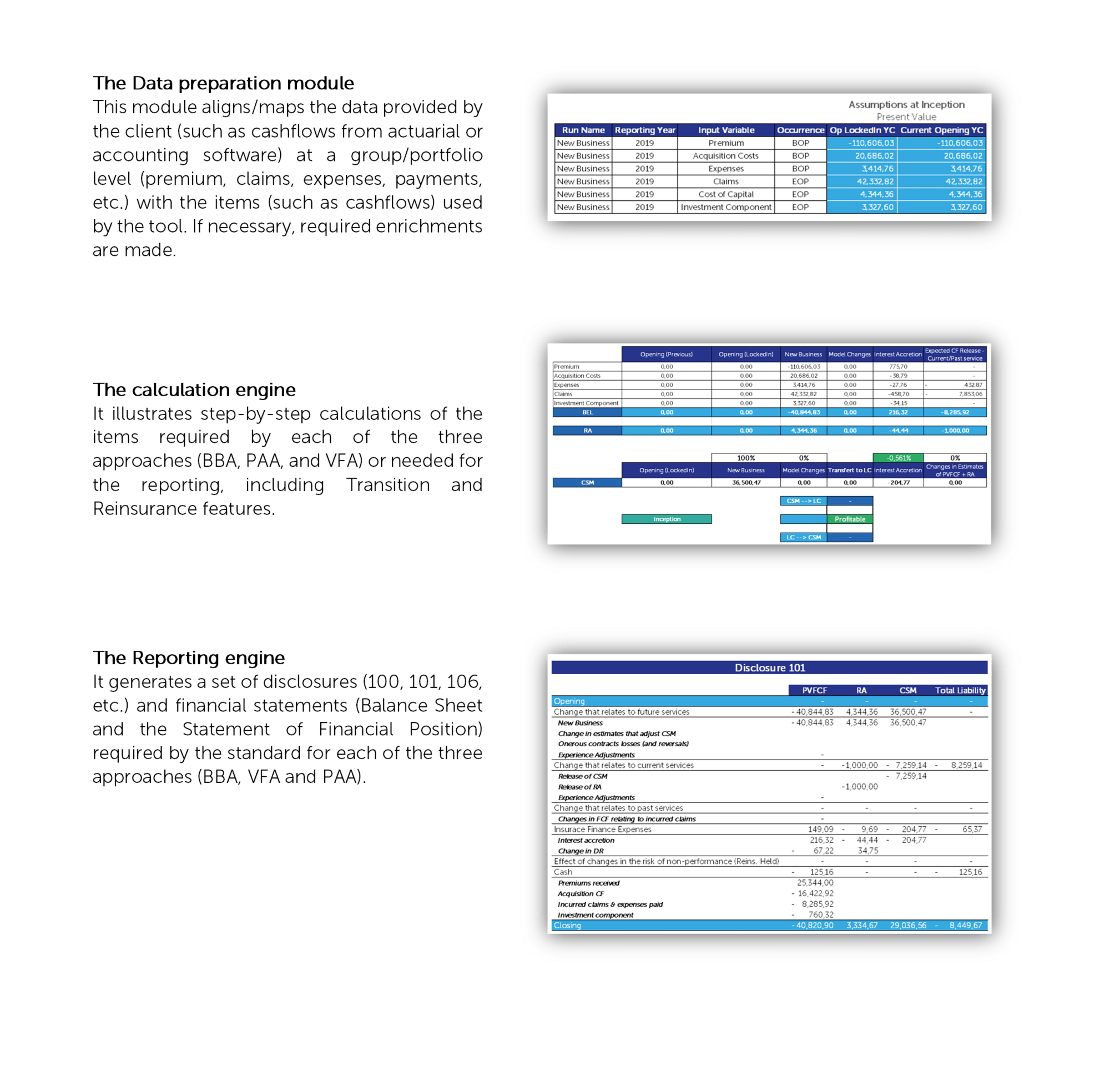IFRS 17 Calculation and Reporting Tool
Finalyse has developed an IFRS 17 calculation and reporting tool for small and medium size insurers. This simple and robust tool can be either used to produce or validate IFRS 17 results. It uses actuals, projected cash flows and market data as input to generate IFRS 17 measures and standard reporting (Disclosure 100, 101, statement of financial income, balance sheet, etc.).
Finalyse’s IFRS 17 tool is easy to implement, user-friendly and adaptable to our clients’ requirements. It is far from being a black box as its transparency allows each IFRS 17 measure to be auditable and traceable throughout the calculation chain.
Finalyse’s IFRS 17 tool can be easily adapted to our clients’ interpretation of the standard and policy choices.
It meets all the minimum IFRS 17 reporting requirements but can also be customised to produce additional and more granular reportings according to our clients' specific needs in terms of breaking down IFRS 17 results and internal ad hoc or regular reportings.
Our validation toolkit includes a broad library of use cases which may also be used for illustration purposes as well as for validation purposes.
Our IFRS17 implementation partner team comprises of very experienced IFRS 17 actuaries, business analysts and project managers who will accompany you through each step of your IFRS 17 implementation or IFRS 17 validation project.
We also provide IFRS 17 training and learning materials for your actuarial, risk and accounting teams.
How does Finalyse address your challenges?
A quick but robust implementation of IFRS 17
IFRS17 validation (of your existing IFRS 17 calculation engine)
Proof of Concepts at the beginning of your implementation project
Impact Assessments at the beginning of your implementation project
Scenario & sensitivity analysis and ALM, Hedging strategy by your risk and investment teams
Planning and forecasting by your financial control teams
Regulatory Context
In May 2017, the IASB (International Accounting Standard Board) published the IFRS 17 standard with an effective date extended to January 1st, 2023 and with a transition period starting from January 1st, 2022.
IFRS 17 standard redefines the treatment of insurance contract liabilities, from the contract definition to the reporting, via the calculation approaches. IFRS 17 represents a significant change for insurers, and the stakes go far beyond the purely accounting aspects. Given the magnitude of the change, the associated costs, and the risk that ineffective implementation would inflict on the company, it is crucial to properly plan the implementation program that covers the E2E IFRS 17 process (from actuarial to consolidation).
Since 2017, solution vendors worldwide have built different software solutions for IFRS 17 implementation. The level of flexibility as well as the transparency and the ability to trace the results vary from one solution to another. Moreover, the standard allows for some degree of interpretation and this may further complicate the understanding of the action performed behind the scenes.

Divyank is a Senior Consultant with more than 8 years of experience and a part qualified Actuary. He has acquired expertise in Solvency II, IFRS17 and MCEV reporting and has worked for life and non-life business. He has extensive experience in Prophet modelling, DCS, statutory valuation and IFRS17 implementation and his coding skills include Prophet and DCS modelling, SAS, VBA, R.

Hassane Boubacar is an actuarial consultant with experience in IFRS 17 implementation and expertise in Actuarial Sciences, Quantitative Finance and Risk Modelling. Hassane has supported several IFRS 17 validation projects. He is an active member of the Finalyse IFRS 17 Centre of Excellence, where he has been involved in the development of the Finalyse IFRS 17 calculation and reporting tool. He also has a working knowledge of the Moody’s AXIS actuarial software and is continuously developing his proficiency in this area.
Finalyse InsuranceFinalyse offers specialized consulting for insurance and pension sectors, focusing on risk management, actuarial modeling, and regulatory compliance. Their services include Solvency II support, IFRS 17 implementation, and climate risk assessments, ensuring robust frameworks and regulatory alignment for institutions. |

Our Insurance Services
Check out Finalyse Insurance services list that could help your business.
Our Insurance Leaders
Get to know the people behind our services, feel free to ask them any questions.
Client Cases
Read Finalyse client cases regarding our insurance service offer.
Insurance blog articles
Read Finalyse blog articles regarding our insurance service offer.
Trending Services
BMA Regulations
Designed to meet regulatory and strategic requirements of the Actuarial and Risk department
Solvency II
Designed to meet regulatory and strategic requirements of the Actuarial and Risk department.
Outsourced Function Services
Designed to provide cost-efficient and independent assurance to insurance and reinsurance undertakings
Finalyse BankingFinalyse leverages 35+ years of banking expertise to guide you through regulatory challenges with tailored risk solutions. |

Trending Services
AI Fairness Assessment
Designed to help your Risk Management (Validation/AI Team) department in complying with EU AI Act regulatory requirements
CRR3 Validation Toolkit
A tool for banks to validate the implementation of RWA calculations and be better prepared for CRR3 in 2025
FRTB
In 2025, FRTB will become the European norm for Pillar I market risk. Enhanced reporting requirements will also kick in at the start of the year. Are you on track?
Finalyse ValuationValuing complex products is both costly and demanding, requiring quality data, advanced models, and expert support. Finalyse Valuation Services are tailored to client needs, ensuring transparency and ongoing collaboration. Our experts analyse and reconcile counterparty prices to explain and document any differences. |

Trending Services
Independent valuation of OTC and structured products
Helping clients to reconcile price disputes
Value at Risk (VaR) Calculation Service
Save time reviewing the reports instead of producing them yourself
EMIR and SFTR Reporting Services
Helping institutions to cope with reporting-related requirements
CONSENSUS DATA
Be confident about your derivative values with holistic market data at hand
Finalyse PublicationsDiscover Finalyse writings, written for you by our experienced consultants, read whitepapers, our RegBrief and blog articles to stay ahead of the trends in the Banking, Insurance and Managed Services world |

Blog
Finalyse’s take on risk-mitigation techniques and the regulatory requirements that they address
Regulatory Brief
A regularly updated catalogue of key financial policy changes, focusing on risk management, reporting, governance, accounting, and trading
Materials
Read Finalyse whitepapers and research materials on trending subjects
Latest Blog Articles
Contents of a Recovery Plan: What European Insurers Can Learn From the Irish Experience (Part 2 of 2)
Contents of a Recovery Plan: What European Insurers Can Learn From the Irish Experience (Part 1 of 2)
Rethinking 'Risk-Free': Managing the Hidden Risks in Long- and Short-Term Insurance Liabilities
About FinalyseOur aim is to support our clients incorporating changes and innovations in valuation, risk and compliance. We share the ambition to contribute to a sustainable and resilient financial system. Facing these extraordinary challenges is what drives us every day. |

Finalyse CareersUnlock your potential with Finalyse: as risk management pioneers with over 35 years of experience, we provide advisory services and empower clients in making informed decisions. Our mission is to support them in adapting to changes and innovations, contributing to a sustainable and resilient financial system. |

Our Team
Get to know our diverse and multicultural teams, committed to bring new ideas
Why Finalyse
We combine growing fintech expertise, ownership, and a passion for tailored solutions to make a real impact
Career Path
Discover our three business lines and the expert teams delivering smart, reliable support



